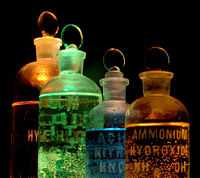Chemistry

"Chemistry is the science of matter, especially its chemical reactions, but also its composition, structure and properties.[1][2] Chemistry is concerned with atoms and their interactions with other atoms, and particularly with the properties of chemical bonds."[3]
| |
Subject classification: this is a chemistry resource . |
| |
Completion status: this resource is just getting off the ground. Please feel welcome to help! |
| |
Resource type: this resource contains a lecture or lecture notes. |
Most of Wikiversity's content on chemistry can currently be found at the School:Chemistry page.
Sciences
Def. a "natural science that deals with the composition and constitution of substances and the changes that they undergo as a consequence of alterations in the constitution of their molecules"[4] is called chemistry.
Def. a science that deals with
- the identification of the substances of which matter is composed,
- the investigation of their properties and the ways in which they interact, combine, and change, and
- the use of these processes to form new substances
is called chemistry.
Def. "a science that deals with the composition, structure, and properties of substances and of the transformations that they undergo"[5] is called chemistry.
Agrochemistry
"Agricultural chemistry is the study of both chemistry and biochemistry which are important in agricultural production, the processing of raw products into foods and beverages, and in environmental monitoring and remediation. These studies emphasize the relationships between plants, animals and bacteria and their environment."[6]
"Agricultural chemistry often aims at preserving or increasing the fertility of soil, maintaining or improving the agricultural yield, and improving the quality of the crop."[6]
Analytical chemistry
"Analytical chemistry is the analysis of material samples to gain an understanding of their chemical composition and structure. Analytical chemistry incorporates standardized experimental methods in chemistry. These methods may be used in all subdisciplines of chemistry, excluding purely theoretical chemistry."[3]
Astrochemistry
Astrochemistry is the study of the chemical composition of stars and outer space.
Biochemistry
"Biochemistry is the study of the chemicals, chemical reactions and chemical interactions that take place in living organisms. Biochemistry and organic chemistry are closely related, as in medicinal chemistry or neurochemistry. Biochemistry is also associated with molecular biology and genetics."[3]
Combinatorial chemistry
Combinatorial chemistry involves the rapid synthesis or the computer simulation of a large number of different but structurally related molecules.
Inorganic chemistry
"Inorganic chemistry is the study of the properties and reactions of inorganic compounds. The distinction between organic and inorganic disciplines is not absolute and there is much overlap, most importantly in the sub-discipline of organometallic chemistry."[3]
Neurochemistry
"Neurochemistry is the study of neurochemicals; including transmitters, peptides, proteins, lipids, sugars, and nucleic acids; their interactions, and the roles they play in forming, maintaining, and modifying the nervous system."[3]
Nuclear chemistry
"Nuclear chemistry is the study of how subatomic particles come together and make nuclei. Modern Transmutation is a large component of nuclear chemistry, and the table of nuclides is an important result and tool for this field."[3]
Organic chemistry
"Organic chemistry is the study of the structure, properties, composition, mechanisms, and reactions of organic compounds. An organic compound is defined as any compound based on a carbon skeleton."[3]
Physical chemistry
"Physical chemistry is the study of the physical and fundamental basis of chemical systems and processes. In particular, the energetics and dynamics of such systems and processes are of interest to physical chemists. Important areas of study include chemical thermodynamics, chemical kinetics, electrochemistry, statistical mechanics, spectroscopy, and more recently, astrochemistry.[7] Physical chemistry has large overlap with molecular physics. Physical chemistry involves the use of infinitesimal calculus in deriving equations. It is usually associated with quantum chemistry and theoretical chemistry. Physical chemistry is a distinct discipline from chemical physics, but again, there is very strong overlap."[3]
Quantum chemistry
Quantum chemistry is the area of chemistry concerned with quantum computations of molecular properties and chemical reactions, including also theories and mechanisms of chemical reactions and processes.
Theoretical chemistry
"Theoretical chemistry is the study of chemistry via fundamental theoretical reasoning (usually within mathematics or physics). In particular the application of quantum mechanics to chemistry is called quantum chemistry. Since the end of the Second World War, the development of computers has allowed a systematic development of computational chemistry, which is the art of developing and applying computer programs for solving chemical problems. Theoretical chemistry has large overlap with (theoretical and experimental) condensed matter physics and molecular physics."[3]
Thermochemistry
Thermochemistry is the study of energy and temperature changes in a chemical process, and is closely related to thermodynamics.
Projects, courses, lessons, lectures, and so forth
See also
- Biochemistry
- Biomolecules
- Blood
- Chemical bond properties, Wikipedia category
- Chemistry glossary
- Fundamentals of chemistry
- High School Chemistry
- Introduction to polymer chemistry
- Medical biochemistry
- Radiation astrochemistry
- School:Chemistry
- Search for Chemistry at Wikiversity
- What is organic chemistry?
References
- ↑ "What is Chemistry?". Chemweb.ucc.ie. Retrieved 2011-06-12.
- ↑ Chemistry. (n.d.). Merriam-Webster's Medical Dictionary. Retrieved August 19, 2007.
- 1 2 3 4 5 6 7 8 9 "Chemistry". Wikipedia (San Francisco, California: Wikimedia Foundation, Inc). June 27, 2012. http://en.wikipedia.org/wiki/Chemistry. Retrieved 2012-07-15.
- ↑ "chemistry". Wiktionary (San Francisco, California: Wikimedia Foundation, Inc). May 13, 2012. http://en.wiktionary.org/wiki/chemistry. Retrieved 2012-07-12.
- ↑ Philip B. Gove, ed (1963). Webster's Seventh New Collegiate Dictionary. Springfield, Massachusetts: G. & C. Merriam Company. pp. 1221.
- 1 2 "Agricultural chemistry". Wikipedia (San Francisco, California: Wikimedia Foundation, Inc). June 12, 2012. http://en.wikipedia.org/wiki/Agrochemistry. Retrieved 2012-07-15.
- ↑ Herbst, Eric (May 12, 2005). "Chemistry of Star-Forming Regions". Journal of Physical Chemistry A 109 (18): 4017–4029. doi:10.1021/jp050461c. PMID 16833724.
External links
| |||||||||||||||||||||||||||||||||||
| |||||||||||||||||||||||||||||||||||